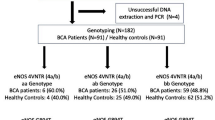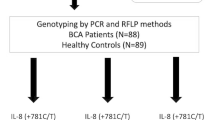Abstract
Background
Chronic inflammation is an important risk factor in the development of bladder cancer. It may stimulate growth and metastasis of cancer cells. The inflammatory process includes MMP activities and expression. MMP activation can be stimulated by various inflammatory cells. Pathological processes such as bladder cancer may occur due to imbalance in MMP activities. In our study, we aimed to determine the relationship between MMP-1, MMP-3 gene variations associated with chronic inflammation and the bladder cancer development.
Methods
Our study was carried out with 89 bladder cancer patients and 78 healthy controls. PCR–RFLP methods were applied to determine MMP-1 and MMP-3 gene variations genotype distributions.
Results
1G/1G homozygous and 1G/2G heterozygous genotypes of MMP-1 gene variation were determined more in patients than controls. The 5A/5A homozygous and 5A/6A heterozygous genotypes of the MMP-3 gene variation were detected more in patients than controls. The significant difference was detected in terms of genotype distributions of MMP-1 and MMP-3 gene variations between these groups (p < 0.05). In addition to, the most common haplotype in the patient group were detected as 1G/2G-5A/6A (20.22%).
Conclusion
In this study, MMP-1 and MMP-3 gene variations were determined as possible genetic risk factors for bladder cancer development in the Thrace population.


Similar content being viewed by others
References
Tran L, Xiao JF, Agarwal N, Duex JE, Theodorescu D (2021) Advances in bladder cancer biology and therapy. Nat Rev Cancer 21(2):104–121. https://doi.org/10.1038/s41568-020-00313-1
Cao Y, Tian T, Li W, Xu H, Zhan C, Wu X, Wang C et al (2020) Long non-coding RNA in bladder cancer. Clin Chim Acta 503:113–121. https://doi.org/10.1016/j.cca.2020.01.008
Cai Z, Liu Q (2021) Understanding the Global Cancer Statistics 2018: implications for cancer control. Sci China Life Sci 64(6):1017–1020. https://doi.org/10.1007/s11427-019-9816-1
Li Y, Sun L, Guo X, Mo N, Zhang J, Li C (2021) Frontiers in bladder cancer genomic research. Front Oncol 20(11):670729. https://doi.org/10.3389/fonc.2021.670729
Liao CH, Tsai CW, Chang WS, Wang ZH, Gong CL, Wu HC, Wang BR et al (2021) Association of matrix metalloproteinase-1 genotypes with bladder cancer risk. In Vivo 35(5):2535–2540. https://doi.org/10.21873/invivo.12535
Argote Camacho AX, González Ramírez AR, Pérez Alonso AJ, Rejón García JD, Olivares Urbano MA, Torné Poyatos P, Ríos Arrabal S et al (2021) Metalloproteinases 1 and 3 as potential biomarkers in breast cancer development. Int J Mol Sci 22:9012. https://doi.org/10.3390/ijms22169012
Balkhi S, Mashayekhi F, Salehzadeh A, Saedi HS (2020) Matrix metalloproteinase (MMP)-1 and MMP-3 gene variations affect MMP-1 and -3 serum concentration and associates with breast cancer. Mol Biol Rep 47(12):9637–9644. https://doi.org/10.1007/s11033-020-05962-x
Napoli S, Scuderi C, Gattuso G, Bella VD, Candido S, Basile MS, Libra M et al (2020) Functional roles of matrix metalloproteinases and their inhibitors in melanoma. Cells 9(5):1151. https://doi.org/10.3390/cells9051151
Tampa M, Georgescu SR, Mitran MI, Mitran CI, Matei C, Caruntu A, Scheau C et al (2021) Current perspectives on the role of matrix metalloproteinases in the pathogenesis of basal cell carcinoma. Biomolecules 11(6):903. https://doi.org/10.3390/biom11060903
Ay A, Alkanli N, Ustundag S (2021) Investigation of the relationship between IL-18 (- 607 C/A), IL-18 (-137 G/C), and MMP-2 (-1306 C/T) gene variations and serum copper and zinc levels in patients diagnosed with chronic renal failure. Biol Trace Elem Res. https://doi.org/10.1007/s12011-021-02828-6
Białkowska K, Marciniak W, Muszyńska M, Baszuk P, Gupta S, Jaworska-Bieniek K, Sukiennicki G et al (2020) Polymorphisms in MMP-1, MMP-2, MMP-7, MMP-13 and MT2A do not contribute to breast, lung and colon cancer risk in polish population. Hered Cancer Clin Pract 18:16. https://doi.org/10.1186/s13053-020-00147-w
Ibrahim F, Essam Elfeky S, Haroun M, Abd Elrahman Ahmed M, Elnaggar M, Abd Elfatah Ismail N, Ahmed Abd El Moneim N AER (2020) Association of matrix metalloproteinases 3 and 9 single nucleotide polymorphisms with breast cancer risk: a case-control study. Mol Clin Oncol 13(1):54–62. https://doi.org/10.3892/mco.2020.2041
Suhaimi SA, Chan SC, Rosli R (2020) Matrix metallopeptidase 3 polymorphisms: emerging genetic markers in human breast cancer metastasis. J Breast Cancer 23(1):1–9. https://doi.org/10.4048/jbc.2020.23.e17
Zhou Z, Ma X, Wang F, Sun L, Zhang G (2018) A matrix metalloproteinase-1 polymorphism, MMP1-1607 (1G>2G), is associated with increased cancer risk: a meta-analysis including 21,327 patients. Dis Markers 2018:7565834. https://doi.org/10.1155/2018/7565834
Li Y, Wang Y, Sun H, Zhang Y, Li H, Cong X, Yin W et al (2018) Association between matrix metalloproteinase-1, 2, 3 polymorphisms and oral cancer risk: a meta-analysis. Genet Test Mol Biomarkers 22(8):456–464. https://doi.org/10.1089/gtmb.2018.0089
Zhou H, Zhu X (2018) Association between matrix-metalloproteinase polymorphisms and prostate cancer risk: a meta-analysis and systematic review. Cancer Manag Res 10:5247–5259. https://doi.org/10.2147/CMAR.S177551
Acknowledgements
This study was performed at departments of Biophysics and Urology in Trakya University Faculty of Medicine. In our study, we would like to thanks at Department of Biostatistics and Medical Informatics in Haliç University Faculty of Medicine.
Funding
This study was not supported by any specific grant from funding.
Author information
Authors and Affiliations
Contributions
All authors contributed to the study conception and design. Material preparation, data collection and analysis were performed by [AA], [NA] and [GC]. The first draft of the manuscript was written by [AA and NA] and all authors commented on previous versions of the manuscript. All authors read and approved the final manuscript. The corresponding author attests that all listed authors meet the authorship criteria and that no other authors meeting the criteria have been omitted.
Corresponding author
Ethics declarations
Conflict of interest
The authors declare that they have no conflict of interest.
Ethical approval
For our study, ethics committee approval was obtained with the TÜTF-BAEK 2020/127 protocol code from Trakya University Faculty of Medicine Non-Invasive Clinical Research Ethics Committee.
Consent to participate
Signed informed consent form was collected from each individual in the patient group with bladder cancer and healthy control group.
Consent to publish
Consent for publication is not required as no identifying personal information is published in this manuscript.
Additional information
Publisher's Note
Springer Nature remains neutral with regard to jurisdictional claims in published maps and institutional affiliations.
Supplementary Information
Below is the link to the electronic supplementary material.



Rights and permissions
About this article
Cite this article
Ay, A., Alkanli, N. & Cevik, G. Investigation of the relationship between MMP-1 (− 1607 1G/2G), MMP-3 (− 1171 5A/6A) gene variations and development of bladder cancer. Mol Biol Rep 48, 7689–7695 (2021). https://doi.org/10.1007/s11033-021-06775-2
Received:
Accepted:
Published:
Issue Date:
DOI: https://doi.org/10.1007/s11033-021-06775-2




